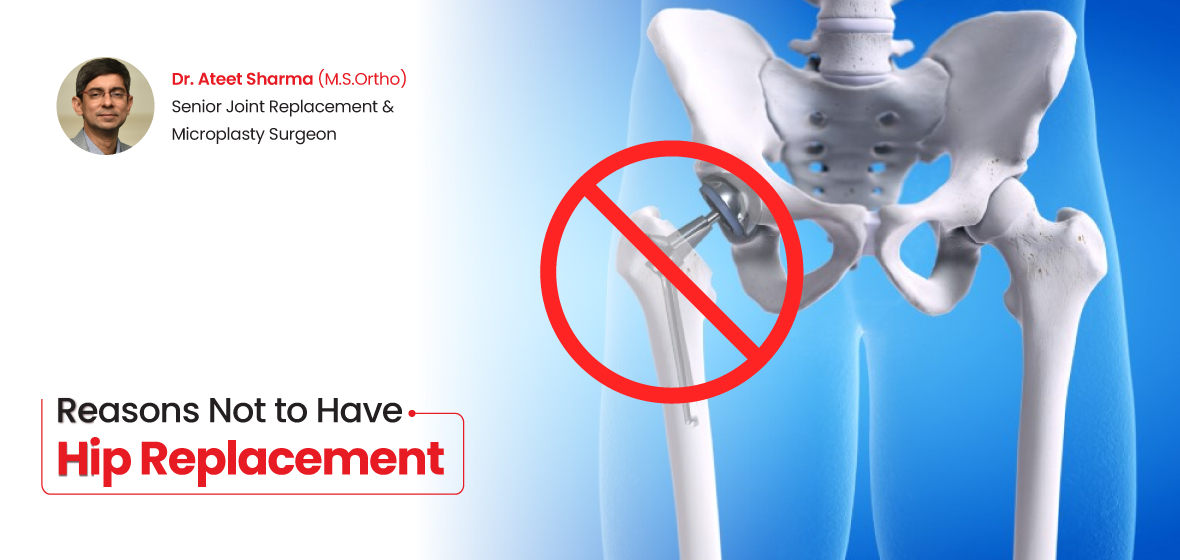
When it comes to deciding whether or not you want to have hip replacement surgery, this can feel like a big decision. It is quite possible that if you are dealing with chronic hip pain, the solution must be surgery. But surgery is not always going to be the most appropriate or only solution for all people. For some, the risks related to surgery may not be worth it. Some will determine they are more well-suited for non-surgical alternatives, with their daily living, health ailments, or personal circumstances. You can visit Dr Ateet Sharma to get a proper idea of your situation, as he is the best-known doctor for Hip Replacement Treatment in Ahmedabad.
And now, you may be thinking to yourself why hip replacement surgery might not be for me, but before knowing the exact reason! Or into any thoughts, let us explore this through a brief of approaching it with an alternative that can alleviate your pain and offer better mobility without literally being cut open.

Although hip replacement is a common and generally safe procedure, not everyone with hip problems should undergo surgery. These include people in the following groups who should be advised to delay or avoid surgery.
More active or young patients : If you are under 50 and maintain a very active lifestyle, then hip replacement may not be for you. Those who require surgery benefit from prosthetics that are guaranteed only for a limited period, which wear out faster if they are used frequently and actively (running or physical labor). Revision surgery at a young age necessitates doing it again later in life, making the process more complex.
Uncontrolled health conditions : If you suffer from heart disease, uncontrolled diabetes or have marked obesity and these clinical scenarios are not controlled, then the risks of surgery increase. All of this has the potential to complicate anaesthesia, impair healing and increase vulnerability to infection.
Patients who have not undergone non-surgical treatments : Surgery should generally be the last option after transitional medicines, for example, physical treatments and relief from discomfort drugs. These things may provide pain relief without operation completion.
Patients at high risk of infection : If you have a weakened immune system or suffer from chronic illnesses that would cause you to be more susceptible to infections, surgery may not be the best option. Surgery related to an infection can lead to additional problems or even secondary surgery may be needed.
The inability to comply with post-surgery rehab : Rehabilitation is vital for recovery. Surgery would be less successful, and recovery could take longer if you were not able to complete physical therapy, secondary to other health issues or practical barriers.
Elderly patients with limited life expectancy : If you are within the later tiers of lifestyles with excessive fitness problems, the advantages of surgical treatment might not justify the healing time and dangers. In such instances, managing aches with non-surgical methods could be a better choice.
Hip replacement surgery can be life-changing for a lot of people, but it is not without its dangers. Some of the major reasons why patients might back out or delay surgery, let us read in depth.
Complication and risk : A hip replacement is a major surgery like so many, and the chances of blood clots, in addition to infections, are relatively high, even with straightforward procedures. These complications are a great deal more riskier for patients who already had illnesses before, which essentially makes surgeries even harder for these guys.
Longer time duration : Hip replacement requires tremendous rehabilitation. This procedure can be dreadful for sufferers with limited mobility or people who want to avoid aftercare services. Those who are not able or unwilling to commit to the longer recovery may also determine in opposition to surgical treatment.
Alternatives : Surgery is not always needed. Non-operative treatments such as physical therapy, cortisone injections, and pain management techniques can often bring great relief and defer the need for surgery. These treatments are non-invasive, and many patients report they help them reduce their pain while maintaining mobility without any surgery.
Revision surgery : Fear of repeat surgeries occurs. Younger people are highly likely to require another surgery or perhaps even a third one later. Because each surgery carries additional risks, some patients wait as long as they can before committing themselves to their first hip replacement.
Lifestyle Impact : Reduction in physical mobility for some time and making lifestyle changes post-hip replacement surgery. The majority of surgeons agree that for many patients, making the temporary or permanent lifestyle changes demanded after surgery is much more restrictive than struggling to control devastating physical symptoms.
A hip replacement treatment can provide good relief for those tortured by continual hip pain. However, it’s not a preference for everyone. Younger, active individuals, patients with uncontrolled health conditions, or those at high risk for complications might discover that surgery isn't always the best for them. Always consult with your healthcare provider, before preparing for Hip replacement surgery. You can visit Dr Ateet Sharma, the best hip replacement surgeon, to speak about your situation and consider all available options before making a final decision.
© 2025 Dr.Ateet Sharma All rights reserved. | Manage by Nexus